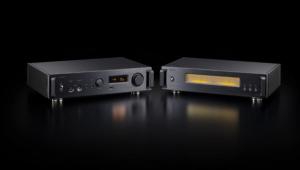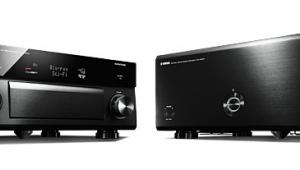Meridian G61 THX Surround EX Ultra2-Certified Surround Pre/Pro & G55 Five-Channel Amplifier Page 2
The Meridian G61 allows several "type" configurations for speaker systems: one for all-analog speaker systems, one for all digital speakers (powered, with built in D/A converters which means Meridian speakers) and another for a mix of analog and digital loudspeakers. "Speaker options" selects the number, type and size of the speakers. You can configure the center channel speaker to operate "always," "never," "for music," or "for movies."
Meridian provides the usual source and digital input assignment choices, along with a straightforward test-tone based calibration procedure. The 80Hz THX subwoofer crossover is observed as the default, though you have the choice of implementing the crossover anywhere between 30Hz and 150Hz in 5Hz increments. In addition, the crossover frequency can be independently set for music, logic (derived matrix), and 5.1-channel playback.
Also included is a (loud!) adjustable frequency and sweep-rate sine wave test tone for helping determine the correct crossover frequencies as well as checking for room resonances. You can also trim each analog input's sensitivity to maximize S/N ratio and avoid clipping.
The G61 offers two sets of DSP options, one for expanding two-channel sources to surround sound, and one for optimization of playback for 5.1- or 6-channel sources. The two-channel DSP options include "Music," which extracts information common to both channels and steers it to the center channel. Also implemented here is proprietary, selectable equalization designed to compensate for the center channel's tonal balance and for the fact that the frequency response of our hearing changes with direction.
"Trifield," another processing choice, starts with what "Music" does, and then alters the L/C/R information, using phase and amplitude differences between them in order to redistribute the sound on a frequency-dependent basis. Meridian claims a significant improvement over traditional stereo, which is strictly amplitude based between the channels. Meridian suggests using "Trifield" on well-recorded stereo recordings. The claimed advantages over "Music" include greater focus across the stage-front and an ability to adjust the image width.
"Ambisonics" is for decoding the UHJ format, a two-channel stereo compatible encoding system recorded with, among other devices the Calrec "Ambisonic" microphone. There are more two-channel processing choices (including "stereo" and "direct") but I'll skip them in the interest of conserving web space and not putting you (and me) to sleep.
However, note that in both "Music" and "Trifield" there are five settable parameters, as there also are in both "Ambisonics" and another processing option, "Super DSP." In the "Ambisonics" mode you can actually choose your seat among seven "rows."
The multichannel DSP options include four Music presets: "Discrete," PLIIx Mus6, THX music, and Ambisonics B. There are also five Movie presets: Cinema, PLIIx Mov6, THX, THX Surround EX, and THX Ultra2 Cinema. Within these choices are yet more parameter settings.
In other words, if you're an audio/videophile who likes to play with sound and play with surround sound, the G61 offers endless configuration possibilities. Towards that end Meridian offers you the option of modifying the parameters within the built-in presets, or creating up to ten of your own presets from scratch. For a good article on processing two-channel sources to produce more than two channels of sound, see the April 2007 issue of our sister publication, Stereophile.—Ed.
While all of this flexibility may seem overwhelming, thanks to reasonably well written instructions, excellent ergonomics, and a well thought out menu system, setting up, configuring and customizing the G61 is not all that difficult. You can do a basic setup and be done with it, or dig deeply and customize the G61 to do your sonic bidding.
After a few months of using the G61, I wiped its slate clean and attempted to reconfigure it from scratch without the instructions. I found the operating system intuitive and relatively easy to remember how to use.
The Meridian System Remote (MSR+)
Meridian includes an MSR+ tabletop style programmable, multi-source remote control, which is convenient if you have a coffee table in front of your couch, and far less so if you don't. The MSR+ is a relatively wide, wedge shaped, "tabletop" keyboard style device, meant for use on a flat, steady surface. If you don't have a table in front of your couch you will find the remote unwieldy as a "hand held." Not a deal breaker of course, but be sure to check it out before buying. Along with controlling other Meridian gear, the remote can be programmed to control other brands using the code numbers supplied or by using a semi-automatic procedure explained in the manual.

High-End Sound in Stereo and Surround
I don't consider my
Lexicon RV-8 receiver a sonic slouch. In fact, it sounds very good—a cut or five above your average A/V receiver. But switching to the Meridian separates produced an immediately obvious, not at all subtle sonic improvement. Completely taken out of the picture were all of the metallic, glazed and edgy sonic artifacts present in most A/V gear.
In their place were the velvety, supple-yet-sharp and fast transients great audio gear can produce, along with the overall control, authority and rhythmic certainty that announce "high performance audio" in no uncertain terms.
Whether it's because of the absence of video circuitry, the inherent quality of the design, or both, the intrinsic quiet of this combination sets it apart even from lesser separates. Music and cinema sound emerge from the blackness one associates with high performance two-channel audio.
Cardboard cutout images become solid and three-dimensional, instrumental timbres seem to unfurl colors previously locked away under the electronic haze. The picture becomes "organized" in a way that seems to subjectively slow time, causing musical events to "pop" where they previously just slid by. It's a quality even audio novices notice when first confronted by a high performance audio system. The Meridian duo exuded all of these sonic qualities.
At The Movies
I can't say the G61 decoded Dolby Digital and DTS noticeably better than my reference receiver, or more effectively than any of the better receivers I've reviewed. However, familiar, sonically superior movies sounded noticeably cleaner, more natural, relaxed and, especially, more transparent.
- Log in or register to post comments






























































